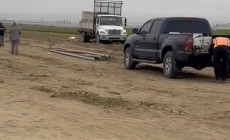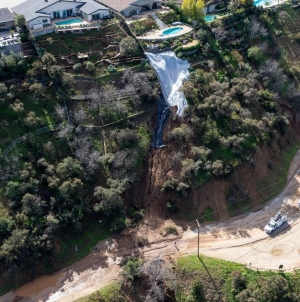-
Work continued after a woman was killed in a carrot field. - November 3, 2023
-
A portion of Mulholland Drive, damaged by mudslides in winter storms, reopens - May 26, 2024
-
‘Maybe You Don’t Want to Win’ - May 26, 2024
-
Donald Trump Putting Law Enforcement in Danger: Attorney - May 25, 2024
-
Avoid the waters of these 5 L.A. County beaches this holiday weekend, public health officials say - May 25, 2024
-
Bawdy Comedy ‘Anora’ Wins Palme d’Or at Cannes Film Festival - May 25, 2024
-
Map Shows Heat Wave Zone Spread Into Five New States - May 25, 2024
-
Azusa police arrest suspected slingshot-wielding vandal - May 25, 2024
-
Donald Trump Hammers Judge Ahead of Jury Instructions - May 25, 2024
-
Sometimes U.S. and U.K. Politics Seem in Lock Step. Not This Year. - May 25, 2024
Work continued after a woman was killed in a carrot field.
Miriam del Carmen Ramirez was walking back into the carrot fields in New Cuyama after a brief work break, and looked over her shoulder to check on her mother, who was just a few yards behind.
As a crew of about 60 workers were headed back to finish picking the field, she heard the engine of a truck nearby, then panicked yelling.
“You could hear people screaming, and I couldn’t see my mom,” the 24-year-old farmworker said.
A truck driver driving in reverse had struck her mother, Rosa Miriam Sanchez, 58, prompting workers to scream for the driver to stop. Ramirez said she ran to her mother, who died in her arms as she called 911 for help.
As tragic as the death was, witnesses told The Times that they were further incensed when the workers at Grimmway Farms were told to finish picking the carrot fields while Sanchez’s body lay under a blanket a few feet away and authorities inquired about the incident.
The Sept. 20 accident in Santa Barbara County has prompted an investigation by Grimmway Farms and Cal/OSHA — the state agency that regulates workplace safety. But farmworkers say they also want an investigation into supervisors’ decision to order laborers to finish picking carrots while Sanchez’s body still lay in the dirt. Some workers said the incident had left them shaken, and some have chosen to look for other work rather than return to the farm.
“I don’t know who gave that order for them to continue working, but I found it extremely disrespectful, and that specific order just proved that they don’t care about us for nothing,” said Ernesto Perez, a farmworker who saw what happened and ran over to help Sanchez. “Even a worker losing their their life wasn’t going to stop them from finishing the work. We’re just a piece of trash for them.”
In a statement, Grimmway Farms said it was conducting an internal investigation into the circumstances of Sanchez’s death, as well as reviewing why workers returned to work after the crash. But President and Chief Executive Jeff Huckaby said in the statement that the company did not believe the directive to keep working was made by Grimmway Farms.
“We are heartbroken by Ms. Sanchez’s death and for all those impacted by this accident,” the statement read. “Based on early findings from our ongoing internal investigations, we do not believe a directive was made by Grimmway to continue work on the day of the accident. However, it is evident that work should have ceased immediately.”
An investigation by the Santa Barbara County Sheriff’s Office determined that the crash was an accident, a spokesperson for the agency told The Times.
But Ramirez and other farmworkers are calling for an investigation into how the incident was handled. They are also demanding an inquiry into safety concerns that they had about the truck and the driver involved, and why workers were told to finish picking the carrot field with Sanchez’s body nearby.
A spokesperson for Cal/OSHA confirmed the agency had opened an investigation into the incident. The agency has also opened inspections of the contractors involved, including Esparza Enterprises Inc., which hired the workers, and M & M Labor Inc., which hired the unidentified driver. The agency would not confirm details of the investigation.
As with many commercial farms in the country, Grimmway often uses labor provided by a network of contractors that hire the employees to work on the farms.
Those contractors, such as in Sanchez’s case, often supervise and direct the workers while they’re in the field. Ramirez said she and her mom had been working at Grimmway Farms since May under the supervision of Esparza Enterprises.
Representatives of Esparza Enterprises and M & M Labor did not return calls seeking comment for this story.
Video taken by farmworkers shows a body covered by a blanket behind a flat-bed truck. A few feet away, workers are seen bent over in the field, picking carrots from the dirt.
“They went back to work right away,” Ramirez said. “My mom was right next to it, but a different crew went over and finished that piece.”
One witness said one of Sanchez’s co-workers walked over at one point and put a cross on her covered body.
A spokesperson for Grimmway Farms said that the company had no confirmation from its internal review that people were instructed to continue working, but added that the farm was considering new communications training and procedures “to ensure this does not happen again.”
“In the tragedy of the moment, while help was being called, aid was being rendered, and the scene was being secured so investigations could be conducted, we regret that a formal announcement was not made immediately that all work should be stopped in the field,” the spokesperson said.
One farmworker, who witnessed the incident and asked not to be identified for fear of losing her job, told The Times that one of the work crews was asked to finish picking the field that Sanchez and her crew had been tasked with that day. The second crew was told that if they declined, a different crew would replace them to finish the field.
“That same day, they proved that even if you lose your life, they’re going to continue,” Perez said. “As long as we make them money, they don’t care about us.”
Perez and Ramirez said workers had aired safety concerns about the truck and the driver to supervisors before the accident, including worries that the truck did not sound an audio alert when it was driving in reverse, and concerns that the driver drove down the field at high speeds.
The truck routinely drives near farmworkers on the field, picking up crates of carrots as the laborers move down the field, workers said.
The three farmworkers who spoke with The Times said workers had also aired concerns about the driver hitting things in the past, including water jugs and the mirror of a tractor.
A spokesperson for Grimmway Farms said the company was unaware of any previous concerns about the driver.
“To our knowledge, concerns regarding the driver were never relayed to the Grimmway safety department or leadership,” the spokesperson said in an email. “Our investigation is ongoing, and we will take appropriate actions based on the findings.”
Grimmway farms is also working with the contractor that employed the unidentified driver, Garcia Trucking and its affiliate M & M Trucking, to install cameras and alarms on the vehicles, the spokesperson said.
Perez said that when he saw the truck run over Sanchez on Sept. 20, about seven people nearby began to yell at the driver to stop.
“When I saw her, I started freaking out,” he said of Sanchez.
The driver stopped, Perez said, and then drove the truck forward, running over Sanchez a second time.
“She passed right there on the filed,” Perez said. “There was no way to help her.”
The driver no longer drives for Garcia Trucking and is not permitted to drive on Grimmway Farms property, the farm spokesperson said.
Perez said that the incident left him shaken and that he had not returned to work for the contractor since, even though he’s struggling to find ways to make a living.
He had grown close to Sanchez over the years, he said, carpooling to the fields at times. When his mother died, Perez said, Sanchez helped him through his grief.
“She had her own way of showing you her love,” he said. “She always spoke her mind, like my mother. She didn’t let anyone give her [grief], and I liked that.”
Her death has been devastating, but seeing workers ordered to finish harvesting the field while her body was still lying on the ground has left him angry, he said.
“They didn’t value her life for anything — it was like roadkill for them,” he said. “I can’t go back. After seeing that, I can’t go back to that.”
Instead, he’s picked up odd jobs in construction.
Since her mother’s death, Ramirez said, she too has stopped working for the contractor. She has returned to the fields for work, but she and her younger brother are now saving money to move away from the area.
“We’re going to try to move,” she said, “and just live as normally as we can.”
Source link
































